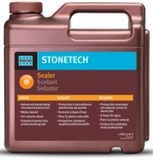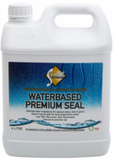You’ve invested your time and money in a beautifully designed countertop carved and installed in your home, now the question is ‘how do I maintain its beauty for as long as possible?’
We have some tips for caring and cleaning these porous surfaces which are susceptible to etching and staining, especially in the kitchen.
SEALERS
When properly selected and applied, sealers are extremely beneficial in the protection, ongoing maintenance and longevity of your stone countertop. The sealers main function is to provide stain resistance to porous stone. It is very important that you understand the meaning of "resistance" versus "stain proof" in this context.
Resistance should be viewed in terms of "reaction time". That is, a period of time that the sealer will hold out the contaminant, allowing easy removal from the stone surface before there is any penetration of the stain. The sealer buys you more time to avoid the stain from penetrating.
APPLICATION
To reduce stains and etching, we recommend applying a sealant every three months (once a quarter). Typically, the smallest size container you can buy is a 1L container. This should last you one year if kept in room temperature location away from light and heat. “Sealers are like buying time” Con says. “What it is doing is sealing the top of the stone so things won’t penetrate quickly”.
“If you were to spill red wine on a counter-top and leave it overnight, you will have a stain, no matter what. However, if you wipe it up instead of leaving it sit, the sealant provides a barrier. It allows us time to clean the stains before they penetrate through the surface.”
WATER-BASED vs SOLVENT BASED SEALERS
Sealers are either water-based or solvent-based. The water undergoes natural evaporation, while the solvent flashes off quickly. Since solvent-based sealers have been around for a lot longer than water-based sealers, there are those who feel the solvent-based technology must be superior. The truth is, that although there are subtle differences relating to the application techniques and curing times, performance levels are comparable.
You can buy sealers from most tile shops. We recommend any of the following to our customers (Sold at our online store www.sydneyhardware.com.au) :
SOLVENT BASED (strong chemical smell when applied, like acetone)
|
KR33
|
Ideal for All absorbing natural stone: polished granite and marble. Do not use on white or light crystalline marble
BUY KR33 online A product of GENERAL Chemical Engineering. Italian manufactured. |
|
Ever Clean
|
Recommended for all types of porous surfaces unfinished, polished, hammered-rough, flashed of marble, granite, natural stone, cement, limestone, terrazzo, slate, wall-covering, travertine roof tiles, flowers pots etc. Specially suitable and recommended for the treatment and protection of white and delicate marbles. BUY Ever Clean online A product of GENERAL Chemical Engineering. Italian manufactured. |
WATER BASED
|
KR33 Natura |
Ideal for All absorbing natural stone: polished granites and marbles Do not use on white or light crystalline marble BUY KR33 Natura online A product of GENERAL Chemical Engineering. Italian manufactured. |
|
Stonetech |
Recommended for all types of porous surfaces. Standard protection against most stains, preserves natural look of stone. BUY Stonetech online
A product of Laticrete. |
|
Aqua Mix Penetrating Sealer
|
A sealer for all natural stone surfaces, unglazed tile and porcelain.
BUY Aqua Mix online
A product of Aqua Mix |
|
Premium Seal |
Penetrating sealer based in water that provides a natural looking finish on all natural stone and tiles.
BUY Premium Seal online
A product of Spirit |
You've sealed the stone countertop...now what?
Keep It Clean - Wipe spills IMMEDIATELY!
What you need to look out for is not necessarily staining, but etching (corroding of the surface) because anything that is acidic is going to etch the surface.
Etching on a stone surface happens when something like lemon juice, vinegar, alcohol or tomato sauce is splashed, dripped or spilled onto it. The best solution is to WIPE AWAY IMMEDIATELY. If it is not wiped up right away, the acid reacts and eats away at the calcium carbonate in the stone, creating permanent markings that look like dull, slightly darker spots or rings on the stone.
Blot the spill with a paper towel immediately. Don't wipe the area, it will spread the spill. Flush the area with plain water and mild soap and rinse several times. Dry the area thoroughly with a soft cloth. Repeat as necessary. If the stain remains, refer section below for ‘Stain Removal’ solutions.
Avoiding Acidic Solutions
Avoid acidic solutions coming into contact with the stone top. We advise against using vinegar, lemon juice or other cleaners containing acid on your stone top, including bleach. We recommend mild soap and water. “If you react immediately, there’s nothing on a counter-top that you can’t get off with soap and water” Con says.
Wiping down countertops and surfaces with warm, sudsy water and a nonabrasive sponge or cloth is the best method for cleaning, but it will not remove etching or stains that have had time to permeate the surface.
In summary, it is crucial for you to first seal your stone countertop with a quality sealer. This does not have to be done professionally. Each sealer has application instructions which if followed carefully, will do the job. Then we recommend you seal quarterly just to help you buy time for those accidents and spills that do occur! And if you do have a spill, WIPE IMMEDIATELY!
Con
Alvaro Constantino, Director
EURO ABRASIVES Sydney Hardware & Building Supplies










